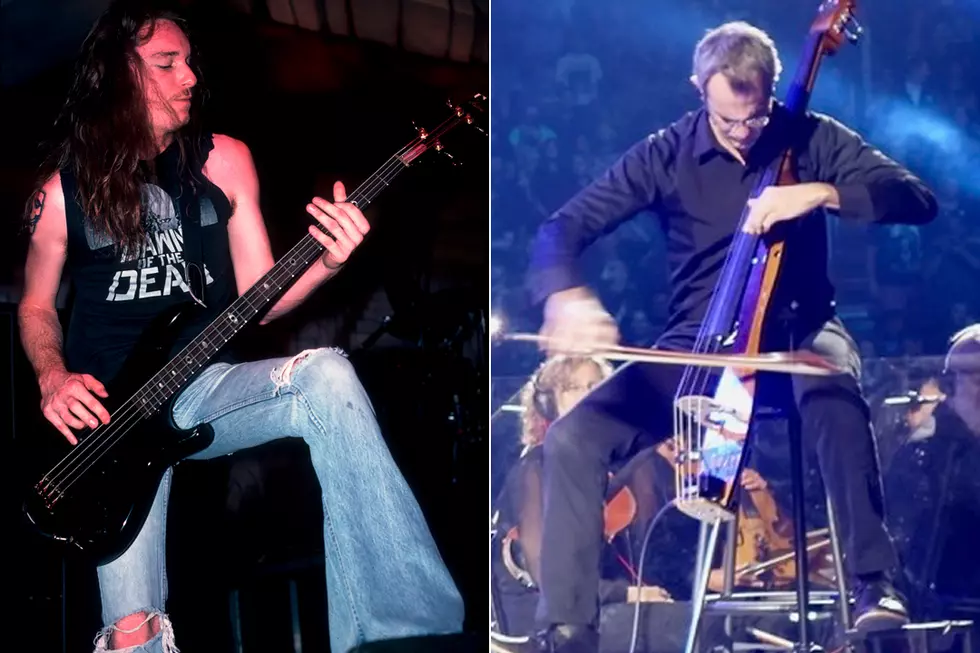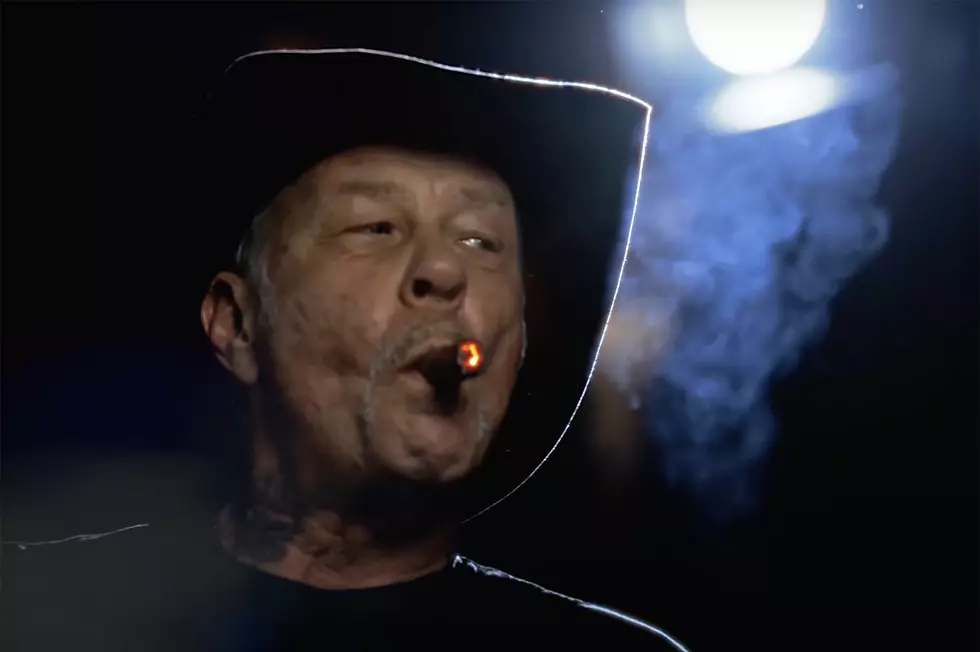
How Scott Pingel Took Cliff Burton’s ‘Anesthesia’ to the Symphony
One of the most inspired and well-received moments of Metallica's recent S&M2 shows with the San Francisco Symphony came when Scott Pingel performed a special tribute version of Cliff Burton's "Anesthesia (Pulling Teeth)" solo on a stand-up bass.
Pingel tells UCR how he spend countless hours and thousands of dollars of his own money to put this tribute to Metallica's late bassist together, without knowing if he'd even be allowed to perform it during the show.
Pingel joined the symphony in 2004, five years after its first collaboration with Metallica yielded the hit S&M album. "I was very well aware of the concert, but I was still a student when the first one happened," he explains. "I became aware of Metallica in my mid-teens. I started playing electric bass when I was about 15. I got a gig in a garage band. We played Led Zeppelin, and we covered a Metallica tune or two. I can't remember which ones, but I recall none of us wanted to sing. So we would cover some of these songs, but we wouldn't sing anything."
Burton's bass playing was of particular interest to the budding musician. "I remember sitting in my house, listening to the Kill 'Em All album, and hearing that solo," Pingel says. "It was such a cool sound, particularly the way he used the effects. I had no idea whatsoever how he did it. I had no idea about effects pedals, but I loved it. I never really explored how to do it until a few months ago."
Pingel's musical exploration soon moved away from rock, beginning with a switch to an R&B-focused cover band with his sister. "I would listen to Metallica, but I wasn't practicing or learning it at that point," he notes. "My focus started to turn more to jazz and fusion, and then in graduate school I put my heart and soul into pursuing an orchestra career. But the seed was still there. [Rock music] was not something that I ever turned my nose up to in anyway ever -- I always loved it."
Watch Scott Pingel Perform 'Anesthesia (Pulling Teeth)'
After it was announced that Metallica would once again be teaming up with the symphony, Pingel began plotting his tribute. "Michael Tilson Thomas, the music director, pulled me aside one day, and said, 'We're brainstorming different ideas and ways we can use the orchestra or members of the orchestra, to involve them a little more in the show so it's not mostly Metallica,'" he explains. "As soon as he said it, I said, 'I think I have an idea, but let me stew on it, think about it and see if I can pull it off.'"
After listening to various versions of Burton's performance, Pingel "started toying around with it on an upright bass. I thought what would be so cool would be to play it bowed, as opposed to finger style on an electric. But I didn't think an acoustic bass would work. I was afraid it would feedback. I came across this company in Italy called Alter Ego, emailed them and they made me an electric stand-up bass for this concert."
He then pitched the idea to Thomas, who liked it and began collecting the necessary symphony and band approvals. "But I was proceeding as if it was definitely going to happen," says Pingel. "I was working on transcribing it, coming up with ideas of what was going to work. I wasn't even sure how much time they were going to give me on the show. I had to decide what licks to include. I wanted to kind of partner with Cliff, so I wanted to write some ideas to go in it. I'm investing a lot of time and money in this just because I wanted to do it well, but I still had no confirmation if it was going to happen."
After a few months, San Francisco Symphony conductor Edwin Outwater notified Pingel that his overall concept was approved, but Metallica wanted to hear the final results for themselves. "He told me, 'Just make sure you're around San Francisco by the end of August,'" Pingel recalls. "I was supposed to go to the East Coast, but I canceled my trip so I could be around whenever they need me. Finally, I get a text message that says, 'All right, they want you today at HQ. They want to hear it.'"
With band members Lars Ulrich, Kirk Hammett and Robert Trujillo, plus more than a dozen Metallica management team members watching, Pingel finally got to demonstrate what he'd been working on. "They set me up where [frontman] James [Hetfield] usually stands," he explains. "I brought my amp, I get my equipment all set up and I realize what a huge operation Metallica is, how many people are involved with this. I was stunned. It looked like there were 20 people standing in a semi-circle around me. Lars is there to my left, and they've got cameras going, because they've got video going all the time, and he says, 'All right, let's hear it ... no pressure.' So I played it, and it was so wonderful because they all just cheered after I finished. It was really moving for me, because Kirk said, 'Man, Cliff would have loved that!' That was so meaningful to me, to hear that from one of his buddies. That really meant a lot."
According to longtime band associate Steffan Chirazi, the original intention was for Pingel to come up with something for he and Trujillo to play. But after Pingel played it for them, Trujillo "felt very strongly" that Pingel perform it solo.
Despite the high-pressure environment, Pingel says nerves weren't really a factor. "I actually felt oddly at home in a way," he says. "I was surprised that I wasn't very nervous. I was more excited than nervous. Many times, I'm very nervous. That wasn't really one of them. Once I got in there, I felt very comfortable. Someone told me later that Lars said, 'I wish everybody showed up this prepared.'"
Hammett was particularly excited about the array of effects pedals Pingel had assembled for the performance: "He said, 'Dude, you found Cliff's sound! What in the heck is all this stuff?' That was really rewarding to hear him give it such a seal of approval."
Speaking to Hammett and Chirazi also helped confirm something Pingel had suspected about Burton's musical interests. "The two of them were filing me in -- Steffan knew Cliff from the mid-'80s. They were saying Cliff was really into classical music and loved Bach. And I actually didn't know that fact about him, but I said, 'You know what? I knew it! When I was working on his solo, I heard Bach in my head.'"
A few days later, Hetfield got his first chance to hear and approve Pingel's take on "Anesthesia," and was there again later when symphony members got their first earful. "They were like, 'I had no idea you had that in you!'" Pingel recalls. "Then James told me later, 'One of my favorite parts about that was watching the reactions of your colleagues in the orchestra.'"
Watch Scott Pingel on the Double Bass
As you can tell from watching fan-shot videos of the two shows, audiences were equally into Pingel's performance. "It was awesome, man, it was so exciting, everybody was having a blast," he recalls, noting that he and the band celebrated by hanging out "until the wee hours of the morning." Pingel and Trujillo in particular bonded over their shared love of late jazz bass player Jaco Pastorius.
"I was at Lars' house [and] he said, 'Thank you so much for all the work you put into that,'" Pingel recalls. "The whole band was so wonderful to me. Robert and I have become such good friends. Those guys are all wonderful. I got to meet [Cliff's dad] Ray Burton. He told me he was weeping during my solo. Of this whole experience, that was the most powerful, hearing it from the father [and] what it meant to him. It's a great job -- music is a gift, there's so much power in it. It was such an inspiring project to do. I'm moved by all of that. I'm thrilled that they found it meaningful and something that was worthy of representing Cliff."
In addition to his duties as principal bassist for the San Francisco Symphony, Pingel also teaches at the San Francisco Conservatory of Music. He leads "both classical and what's called the RJAM program -- roots, jazz and American music. It's pretty jazz-oriented, but we try to explore lots of different types of American music. It's a relatively new program, but i love doing it, because I just love different styles of music."
You'll be able to see Pingel's version of "Anesthesia (Pulling Teeth)," as well as the rest of Metallica's performance with the San Francisco Symphony, when the S&M 2 concert movie debuts in theaters on Oct. 9. To find the screening closest to you, visit Metallica.film.
The Best Song From Every Metallica Album
More From Ultimate Classic Rock









